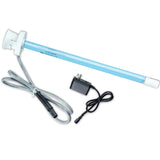Can UVC HVAC Systems Help with Seasonal Allergies?
Posted by Nick on for ProLampSales
One common question we get is whether a UVC HVAC system can help with allergies. And with spring returning to much of the Northern Hemisphere, seasonal allergies are a large concern for people, with nearly a quarter of US adults being affected.
In general, a UVC air purifier installed in a home HVAC system can help with seasonal allergies, but it may not be as effective on its own compared to other air purification methods like filtration.
UVC light bulbs have germicidal properties. When airborne allergens (like mold spores, dust mites, and pet dander) pass through the UVC light, it can deactivate or kill bacteria, viruses, and some fungi that may be in the air. UVC light doesn't "filter" out allergens like a high-MERV rated or HEPA filter would, but it can help reduce the biological components (like mold and germs) that might exacerbate allergic reactions.
Effectiveness for Seasonal Allergies
Pollen: UVC HVAC air purifiers do not remove large allergens like pollen from the air. Instead, UVC can kill or disable the microorganisms carried on the particulates. UVC air purifiers plus filtration is the most effective approach for addressing pollen in indoor air.
Mold, Dust Mites, and Pet Dander: UVC light can help reduce biological allergens such as mold and bacteria, which can contribute to allergy symptoms. However, if you're specifically allergic to dust mites or pet dander, UVC alone will not remove these particles from the air.
In regards to pet dander, it can increase in a home in the spring season, as pets shed their winter coats. But even if UVC was able to reduce this potential allergen, pet fur may never make it into the ductwork to be exposed to the ultraviolet light.
Indoor Air Quality
The biggest benefit of a UVC system in an air-handling unit is reducing airborne pathogens and improving the overall air quality in the home. However, it might be a good idea to combine a UVC air purifier with other methods, like a furnace filter rated to trap small particles, which is much more effective at physically trapping dust, pollen, and other particles.
Installing an indoor air quality monitor is also a good idea, as it can help identify IAQ issues completely unrelated to seasonal allergens. There are some that can sit on a table or desk, while others can be hardwired to a building and sit right next to the thermostat.
Other Tips for Managing Seasonal Allergies
If your goal is to specifically target the larger allergens like pollen and dust mites, consider using a higher-quality filter in conjunction with the home UVC system. HEPA filters can trap particles as small as 0.3 microns, which includes most allergens, although most home furnaces are not sized for the air flow required for HEPA filters. But purchasing filters with a higher MERV rating will ensure smaller particles are caught at the same overall filter size.
Ventilation is also an important factor to consider. Even though it may be tempting to keep windows open on nice days, checking the allergens in your area before doing so is a good idea. Keep your windows closed during high pollen days and use air conditioning with a good filter to prevent allergens from coming inside while keeping the air flowing inside the home.
Finally, regular cleaning helps and should be increased during these times, especially if you have pets or increase yardwork activity in the spring. Dusting and vacuuming frequently can help reduce the allergen load in your home.
Bottom Line on UVC HVAC for Seasonal Allergies
So while a UVC air purifier can play a role, you may need a multi-layered approach with a combination of filters for the best results in managing seasonal allergies. Germicidal systems can improve overall air quality and kill germs, but they are not as effective at filtering out large particles like pollen or pet dander.
Used together, though, UVC HVAC units and high-quality filtration can keep allergens and other irritants to a minimum even if they can't reduce seasonal allergies entirely.
- Posted in Household, Ultraviolet Light
Featured Products (View All)
0 Comments




